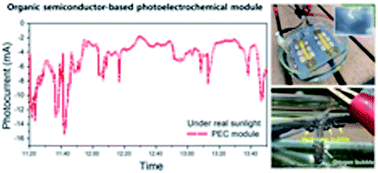A long-term stable organic semiconductor photocathode-based photoelectrochemical module system for hydrogen production†
Abstract
Photoelectrochemical (PEC) water splitting based on organic semiconductors (OSs) is a promising way to enable sustainable hydrogen production because of their high photovoltaic performance and mass productivity by low-cost printing. However, their application to photocathodes has drawbacks such as low efficiency and poor operational stability, which result from rapid device degradation or failure under harsh operating conditions. In this study, we developed a stable and efficient OS-based PEC photocathode module using the metal encapsulation technique. Our OS-photocathode shows a photocurrent density of −12.3 mA cm−2 at 0 V versus the reversible hydrogen electrode (RHE) and an onset potential of 1 VRHE. These are similar to the values of both the short circuit current and open circuit potential of its photovoltaic cell. Notably, our photocathode represents unprecedented stability: maintaining over 95.4% of the maximum photocurrent for over 30 h without significant degradation of the OS. In addition, we successfully demonstrate a PEC module based on OS-photocathodes in parallel connection in a real environment, confirming the potential of the OS-based photoelectrodes for sustainable hydrogen production.



 Please wait while we load your content...
Please wait while we load your content...